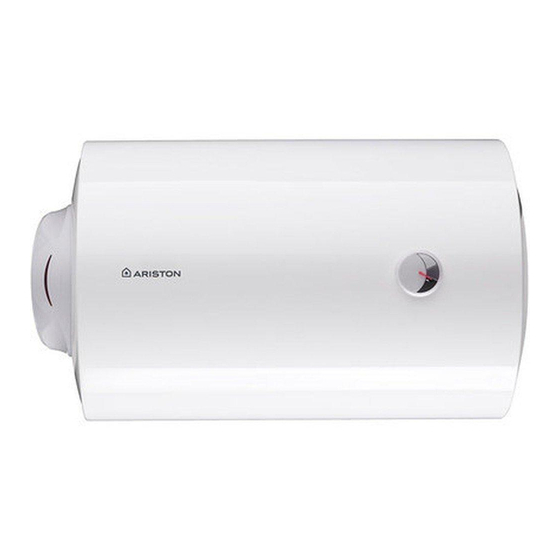Ariston ABS PLT Series Handbuch - Seite 30
Blättern Sie online oder laden Sie pdf Handbuch für Warmwasserbereiter Ariston ABS PLT Series herunter. Ariston ABS PLT Series 36 Seiten.

4.3.2. Safety valve
The safety valve (pressure safety device) must be inspected regularly to check that it is not clogged. Remove the limescale
deposits if necessary. If the safety valve is equipped with a lever, regular valve correct operation check procedure can be
performed with its help.
The drainage pipe of the safety valve may generate water droplets. It is not a defect; it is due to relief work function of the
valve – pressure relief that occurs when water is heated in enclosed space of the inner tank.
4.3.3. RCD (Residual Current Device)
If the appliance comes with a residual current device (RCD) located on the power cord, and then after the tank of the water
heater is lled with water and the system is checked for leaks, put in the moisture-proof electrical plug of the water heater
and do the following:
- Press "RESET" on the RCD housing, LED will be lit, indicating electricity supply.
Then press "TEST", power will be o , as well as LED. Press "RESET" again. If the power LED lit up, it means that the appliance is
safe to use.
- If you press the "RESET" knob, but LED does not light up, contact the Technical Assistance Centre for advice by a competent
person.
4.4. Please note:
4.4.1. When you rst start the water heater, as well as on each start after disconnecting make sure that the water heater was
lled with water, and only then make its connection to the mains.
4.4.2. When the power cord is damaged it must be replaced by a special cord. This cord can be purchased at the Technical
Assistance Centre.
4.4.3. Hot water whose temperature exceeds 50°C at the user taps may immediately cause severe burns or even death.
Children, the medically fragile and the elderly are more exposed to the risk of burns.
4.4.4. Water may drip from the water heater, so do not leave valuable items and equipment under the appliance.
4.4.5. If there is a chance that the temperature drops below 0°C in the room where the appliance is installed, drain the water
from the water heater.
4.4.6. Outlets must be properly earthed.
4.4.7. While in operation, periodically clean the inner tank of the water heater. Particulate contaminants that are present in
tap water may accumulate there.
4.4.8. When there is strong scaling in the heating elements or heavy settlings, drain water, remove the heating elements, and
clean. When assembling them back follow these actions: tightening bolts should be done evenly, with no signi cant force
applied, the xing support should not be tilted. Electricity supply connection can be made only after lling the water heater.
4.4.9. When the water heater is not used for a long time, shut o the cold water supply valve and disconnect the water
heater from the mains. If necessary, drain water.
4.4.10. When water pressure exceeds 5 bar, drops of water may appear in the drainage hole of the safety valve, or it may
cause a leak.
• Rare drip at the drain hole of the safety valve indicates normal operation of the heater.
• Frequent drip at the drain hole of the safety valve means that the water pressure is higher than normal. In this case, the
pressure reducer must be installed in the cold water supply pipe to reduce pressure at maximum distance from the heater.
• To remove appearing water drops, a discharge tube can be used, the end of which should be directed down to the drain,
and it should not be blocked.
4.4.11. In case of water overheating, a thermal fuse conforming to European safety standards CEI-EN breaks the electric
circuit at both leads to the heating element.
4.4.12. Traces of the thermal insulation on the top of the outer shell are the technological features of the production process
and are not defects.
4.4.13. Before making call to the service center, make sure that the problem is not related to water or power outages.
Do not try to repair the appliance under by your own forces. Technical maintenance of the appliance must be carried
out by a competent person. The data and speci cations indicated are not binding and the Producer reserves the
right to carry out any modi cations that may be required without prior notice or replacement.
This product con rms to EU Directive 2002/96/EC-EU 2002/95/EC
The symbol of the crossed waste paper basket on the appliance indicates that at the end of its working life the product
should be disposed of separately from normal domestic household rubbish, it must be disposed of at a waste disposal centre
with dedicated facilities for electric and electronic appliances or returned to the retailer when a new replacement product is
purchased.
The user is responsible for the disposal of the product at the end of its life at an appropriate waste disposal centre. The waste
disposal centre (using special treatment and recycling processes e ectively dismantles and disposes of the appliance) helps
to protect the environment by recycling the material from which the product is made.
For further information about waste disposal systems visit your local waste disposal centre or the retailer from which the
product was purchased.
30
